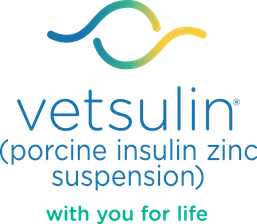

Etiology
Read More About Canine Diabetes
The Cause & Condition of Canine Diabetes
Primary Causes of Diabetes Mellitus
By the time diabetes mellitus is clinically recognized in dogs, they virtually all have type 1 or insulin-dependent disease. This is characterized by beta cell destruction (often due to autoimmune destruction of the islets of Langerhans) and hypoinsulinemia. Insulin secretagogues, such as glucose or glucagon, fail to stimulate endogenous insulin production and there is an absolute requirement for exogenous insulin injections to control blood glucose levels.
Secondary Causes of Diabetes Mellitus
Diabetes mellitus can be secondary to severe inflammation or neoplasia of exocrine pancreatic tissue, which leads to loss of islet function. In these cases, diabetes is also complicated by exocrine pancreatic insufficiency. Diabetes mellitus can also occur when there is either overproduction of counteracting hormones or insulin resistance. Excessive growth hormone production can be seen in intact, cycling bitches. Progesterone produced during the luteal phase of the estrous cycle induces the production of growth hormone by the mammary gland, which counteracts the action of insulin.
Dogs with hyperadrenocorticism produce excessive amounts of glucocorticosteroids that stimulate gluconeogenesis and lead to an increase in the plasma glucose concentration. This stimulates insulin synthesis, which eventually results in exhaustion of the islets of Langerhans. Only about 10% of canine Cushing’s syndrome cases are complicated by diabetes mellitus.
Help Your Practice Manage Diabetes Mellitus
View and download resources and tools that will assist your hospital, inform your team, and help with clients.

Blood Glucose Curve Generator
Create a blood glucose curve to monitor and evaluate diabetes treatments.

Client Discharge Form
Create a customized, printable form for clients about their new diagnosis.

Diabetes Resources
Access online tools and more to support staff and pet parents.
No items to show.
Read More About Canine Diabetes
Important Safety Information:
Vetsulin® should not be used in dogs known to have a systemic allergy to pork or pork products. Vetsulin is contraindicated during periods of hypoglycemia. Keep out of reach of children. As with all insulin products, careful patient monitoring for hypoglycemia and hyperglycemia is essential to attain and maintain adequate glycemic control and prevent associated complications. Overdosage can result in profound hypoglycemia and death. The safety and effectiveness of Vetsulin in puppies, breeding, pregnant, and lactating dogs has not been evaluated. See package insert for full information regarding contraindications, warnings, and precautions.
References:
1. Martin GJ, Rand JS. Pharmacology of a 40 IU/ml porcine lente insulin preparation in diabetic cats: findings during the first week and after 5 or 9 weeks of therapy. J Feline Med Surg. 2001;3(1):23–30. 2. Vetsulin® (porcine insulin zinc suspension) [Freedom of Information Summary]. Millsboro, DE: Intervet Inc.; 2008. 3. Data on file, Merck Animal Health. 4. Graham PA, Nash AS, McKellar QA. Pharmacokinetics of porcine insulin zinc suspension in diabetic dogs. J Small Anim Pract. 1997;38(10):434–438. 5. Martin GJ, Rand JS. Pharmacokinetic and Pharmacodynamic Study of Caninsulin in Cats with Diabetes Mellitus. 2000: Internal Study Report. 6. Feldman EC, Nelson RW. Canine and Feline Endocrinology and Reproduction. 3rd ed. St. Louis, MO: Saunders; 2004:539–579. 7. Tennant B, ed. BSAVA Small Animal Formulary. 4th ed. Gloucestershire, UK: British Small Animal Veterinary Association; 2002. 8. Feldman EC, Nelson RW. Canine and Feline Endocrinology and Reproduction. 3rd ed. St. Louis, MO: Saunders; 2004:486–538. 9. Reusch C. Feline diabetes mellitus. In: Ettinger SJ, Feldman EC, eds. Textbook of Veterinary Internal Medicine. 7th ed. St. Louis, MO: Saunders; 2010:1796–1816. 10. Nelson RW. Canine diabetes mellitus. In: Ettinger SJ, Feldman EC, eds. Textbook of Veterinary Internal Medicine. 7th ed. St. Louis, MO: Saunders; 2010:1782–1796. 11. Burgaud S, Riant S, Piau N. Comparative laboratory evaluation of dose delivery using a veterinary insulin pen. In: Proceedings of the WSAVA/FECAVA/BSAVA congress; 12–15 April 2012; Birmingham, UK. Abstract 121. 12. Burgaud S, Guillot R, Harnois-Milon G. Clinical evaluation of a veterinary insulin pen in diabetic dogs. In: Proceedings of the WSAVA/ FECAVA/BSAVA congress; 12–15 April 2012; Birmingham, UK. Abstract 122. 13. Burgaud S, Guillot R, Harnois-Milon G. Clinical evaluation of a veterinary insulin pen in diabetic cats. In: Proceedings of the WSAVA/FECAVA/BSAVA congress; 12–15 April 2012; Birmingham, UK. Abstract 45. 14. Davison LJ, Walding B, Herrtage ME, Catchpole B. Anti-insulin antibodies in diabetic dogs before and after treatment with different insulin preparations. J Vet Intern Med. 2008;22:1317-1325. 15. Banfield State of Pet Health 2016 Report. p 12-13.
